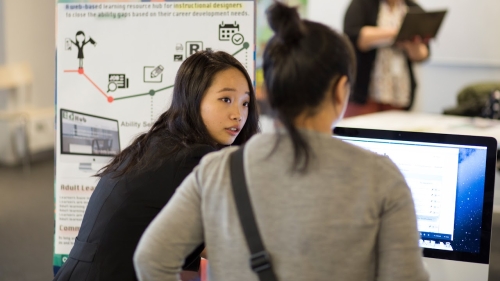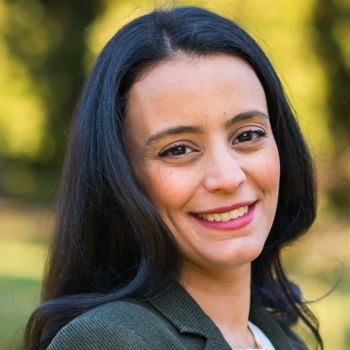

Rinat Levy Cohen is an educational researcher and educator. She is currently a doctoral candidate in Learning Sciences at Fordham University. Rinat’s research interests lie at the intersection between educational psychology, learning sciences, cognitive science, and educational technology. She received an MA in Multilingual Education and Educational Technology from Tel Aviv University.
Rinat’s research is driven by a desire to enhance the design of digital learning environments for science and math education. Her work aims to bridge the gap between the fields of learning sciences and analytics and educational psychology. For example, she examines the relationship between student characteristics (e.g., ethnicity and achievement goals), and help-seeking behaviors in online learning platforms (e.g., ASSISTments). Her work aims to shed light on the design of on-demand support and automated feedback in digital learning environments for all learners.
At The New York Hall of Science (NYSCI), Rinat has been involved in the design of a mobile data-driven dashboard to support group problem-solving for the immersive and multi-user simulation Connected Worlds (CW). Additionally, she is leading the development of a coding scheme that aims to shed light on shared-regulation of learning in synchronous museum simulations such as CW. She recently received a research award from the American Educational Research Association (AERA) for this work.
Her prior work also includes measuring the impact of educational technologies and teaching methods on the acquisition of science skills. For example, Inq-ITS is a science learning platform with simulations for physical, life, and Earth science. The aim of this project was to measure the impact of virtual, inquiry-based science experiments on learners’ ability to perform experiments in the classroom. In the RIDDLE Lab, Rinat explored STEM learning through story-driven game design.
Rinat’s work has been presented at the International Conference of the Learning Sciences (ICLS), the annual meeting of the American Educational Research Association (AERA), and at other conferences in learning analytics, cognitive science, and creativity and making in education.
Previously, Rinat was an educator for over a decade. Her teaching tenure included STEM education and second language teaching around the world. In addition, she served as a mentor for teacher trainees and has been providing professional development to educators on achievement motivation, educational technology, and differentiated instruction.
Selected Publications
- Levy-Cohen, R., Mallavarapu, A., Lyons, L., & Uzzo, M, S. (April, 2021). Studying collective problem-solving regulation in an immersive open-ended museum exhibit (Best Graduate Student Paper Award). Paper presented at the American Educational Research Association (AERA).
- Gobert, J., Dickler, R., Staudenraus, C., & Levy-Cohen, R. (April, 2020). Exploring the transfer of students’ science competencies from virtual inquiry to hands-on inquiry. Paper presented at the American Educational Research Association (AERA), San Francisco, CA.
- Mallavarapu, A., Lyons, L., Uzzo, M, S., Thompson, W., Levy-Cohen, R., Slattery, B. (2019). Connect-to-connected worlds: Piloting a mobile, data-driven reflection tool for an open-ended simulation at a museum. Paper presented at the Conference on Human Factors in Computing Systems (CHI 2019).
- Levy-Cohen, R., Arevalo, J., Battaglia, D., Besharat, R., Bondie, R., Turner, K., Van Owen, G., & Zusho, A. (2019). Urban teens’ use of self-regulated learning strategies: A comparison of survey and diary measures. Paper presented at the American Educational Research Association (AERA), Toronto, Canada.
- Lang, C., Levy-Cohen, R., Woo, C., Roberts, B., Pepe, S., Verma, R., & Xu, Y. (2018). Automated extraction of learning goals and objections from syllabi using LDA and neural nets. LAK-18: the eight-international conference on learning analytics & knowledge.
- Levy-Cohen, R. & Matuk, C. (2017). What children learn from the game design process. Poster presented at the 13th Conference of the International Society for Design and Development in Education, Berkeley, CA.
